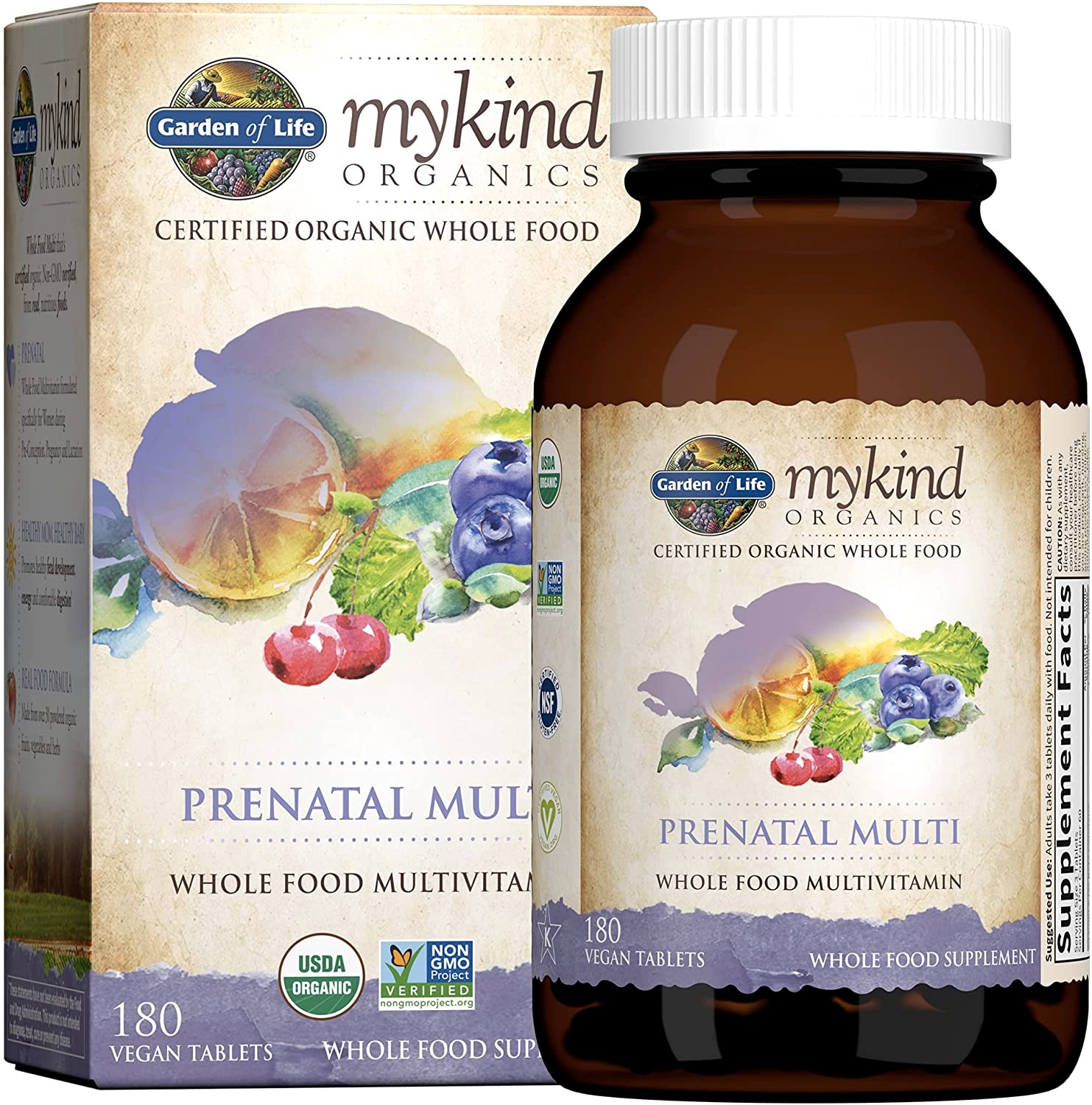In addition to eating healthy and nutritious food, prenatal vitamins help support and provide you with the additional vitamins and minerals you and your baby need to remain healthy. Pregnancy comes with all sorts of bodily changes as your body works harder to care for the tiny human being growing inside you. One of the most universal symptoms of pregnancy is weight gain, which can range anywhere from 10 to 40 pounds (5 to 18 kg), depending on your pre-pregnancy health and BMI.
Despite how loaded with nutrients prenatal vitamins are, they aren’t likely to contribute to pregnancy weight gain. Just like all other vitamin supplements, prenatal vitamins contain zero calories and thus won’t cause weight gain on their own. Any weight gained while taking prenatal supplements can probably be attributed to normal pregnancy weight gain combined with your baby’s actual weight.
Prenatals are an important component of a healthy pregnancy diet, supplying the bulk of your micronutrient needs. This article explains a few factors relating prenatal supplements and weight gain.
What Makes Prenatal Supplements Different from Regular Multivitamins?

Prenatal supplements are formulated specifically for people who are pregnant or hoping to get pregnant. They carry the bulk of the vitamins and minerals both you and your baby need. They contain larger amounts of folic acid to support brain development and prevent neural tube defects, and iron to support proper fetal and placental development as well as prevent anemia. Higher levels of calcium and vitamin D3 support your baby’s teeth and bone development.
It is important that you have a conversation about prenatal supplements with your healthcare provider. Depending on your health history and previous pregnancies (if any), your healthcare provider may recommend specific supplements in addition to your regular prenatals.
Do Prenatals Make You Gain Weight? (Factors)

1. Prenatal Supplements Don’t Contain Calories
Prenatal vitamins contain essential vitamins and minerals that will help support your body systems and maintain a healthy pregnancy. They perform hundreds of functions, from preventing illness and promoting healing to metabolizing proteins and producing energy. They do not, however, contribute to fulfilling your caloric requirement and providing you with energy.
Carbohydrates, lipids, and proteins are the 3 main nutrients that provide you with calories. According to the American College of Obstetricians and Gynecologists, pregnant people need an additional 340 calories in their diet from the second trimester and an additional 450 in their third trimester. Try to get your calories from nutrient-rich whole foods that will help keep you and your baby safe and avoid too much processed or junk food.
2. Prenatal Supplements May Have Side Effects That Mirror Weight Gain
The high iron content of prenatal supplements can cause constipation and bloating for some. This may cause clothes to fit tighter and cause you to feel heavier.
Drinking plenty of fluids, including more fiber in your diet, and incorporating appropriate physical activity into your daily routine should be enough to combat these side effects. Otherwise, you may want to ask your healthcare provider about taking a stool softener or other laxatives.
3. Prenatal Supplements Can Affect Appetite
While prenatal supplements do not directly enhance your appetite, vitamin B6 found in most prenatals can decrease first-trimester nausea, helping improve your appetite.
On the other hand, the flavors of some prenatals can cause you to lose your appetite. Some prenatal supplements containing DHA and omega fatty acids may cause indigestion in some people. DHA often leaves a fishy aftertaste which some people find unpleasant. The high iron content may cause nausea, cramping, and constipation in some people, which contributes to a diminished appetite.
Iron supplements are best absorbed on an empty stomach. Taking supplements on an empty stomach may, however, cause indigestion and nausea for some. Prenatal vitamins, in general, should be taken with meal for best absorption. Taking your supplement during breakfast or lunch, or at night with a light snack before going to sleep, may help prevent these side effects.
What Causes Pregnancy Weight Gain?
A portion of the weight you gain during pregnancy belongs to your growing baby. Most pregnancy weight gain is actually due to additional fluid, such as the amniotic fluid surrounding your baby. Blood volume also increases during pregnancy, usually around a 45% increase in normal singleton pregnancies.
The placenta and uterus also increase in weight the further along you are in your pregnancy. Breast swelling also contributes to weight gain. Fat stores can also add around 4.5 to 9 pounds (2 to 4 kg) of pregnancy weight.
How Much Weight Gain is Normal During Pregnancy?

There is no single standard for normal weight gain during pregnancy. Nowadays, recommendations for pregnancy weight gain differs based on pre-pregnancy weight and BMI.
- People who are underweight or have a pre-pregnancy BMI of less than 18.5 should gain between 27.5 and 40 pounds (12.5 and 18 kg).
- People with a normal weight or have a pre-pregnancy BMI between 18.5 and 24.9 should gain between 25 and 35 pounds (11.5 and 16 kg).
- People who are overweight or have a pre-pregnancy BMI between 25 and 29.9 should gain between 15.5 and 25.5 pounds (7 and 11.5 kg).
- People who are obese or have a pre-pregnancy BMI greater than 30 should gain between 11 and 20 pounds (5 and 9 kg).
How Quick Should Weight Gain Be During Pregnancy?
Changes to your body begin early on pregnancy but usually only become more apparent in the later months. Commonly, people can expect to gain between 1 and 4.5 pounds (0.5 and 2 kg) in the first 3 months of pregnancy. For the remainder of the pregnancy, singleton parents usually gain one pound (0.5 kg) a week, while twin parents can expect to gain 1.5 pounds (0.7 kg) a week.
Extremely rapid weight gain of 2 pounds (1 kg) or more a week can be a sign of health problems such as pre-eclampsia and gestational diabetes. If you are gaining more than 1 pound (0.5 kg) a week while pregnant, your healthcare provider may monitor your weight more closely and run tests to identify and treat any problems.
3 Prenatal Supplement Recommendations
-
To Combat Morning Sickness
Studies have shown ginger to beneficial for preventing pregnancy-related nausea and vomiting. Prenatal supplements containing ginger such as New Chapter Perfect Prenatal Vitamins may help calm digestive issues and combat appetite loss caused by some supplements.

-
Liquid Options
Some studies suggest that liquid vitamins have greater bioavailability than tablets and capsules. Because they are more readily absorbed by the body, they might be less likely to cause digestive issues.

-
Certified Organic Supplement
Supplements with organically sourced compounds offer cleaner nutrition than their synthetic counterparts. Garden of Life Mykind Organics Prenatal Vitamins in particular are also vegan and gluten-free in addition to being organic.

Bottom Line
Fueling your body properly with good, nutritious food during your pregnancy is key in keeping yourself and your growing baby healthy. Prenatal supplements on their own will not cause you to gain weight any more than your pregnancy will. Some people may experience side effects such as constipation and bloating while taking prenatals, which may feel like weight gain.
Weight gain during pregnancy is normal and is important for maintaining a healthy pregnancy, having a safe delivery, and supporting your baby’s health in general. Normal weight gain during pregnancy is different for every parent and is dependent on pre-pregnancy weight. Discussing your pregnancy weight gain targets with your healthcare provider will help with the early spotting of any red flags, such as abnormally rapid weight gain or lack of weight gain.
